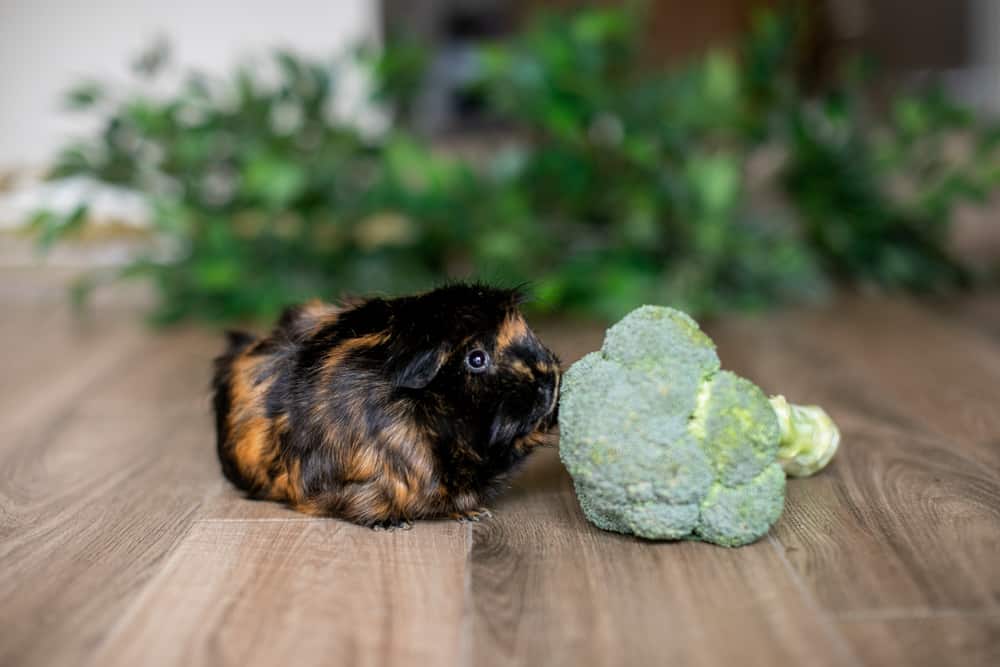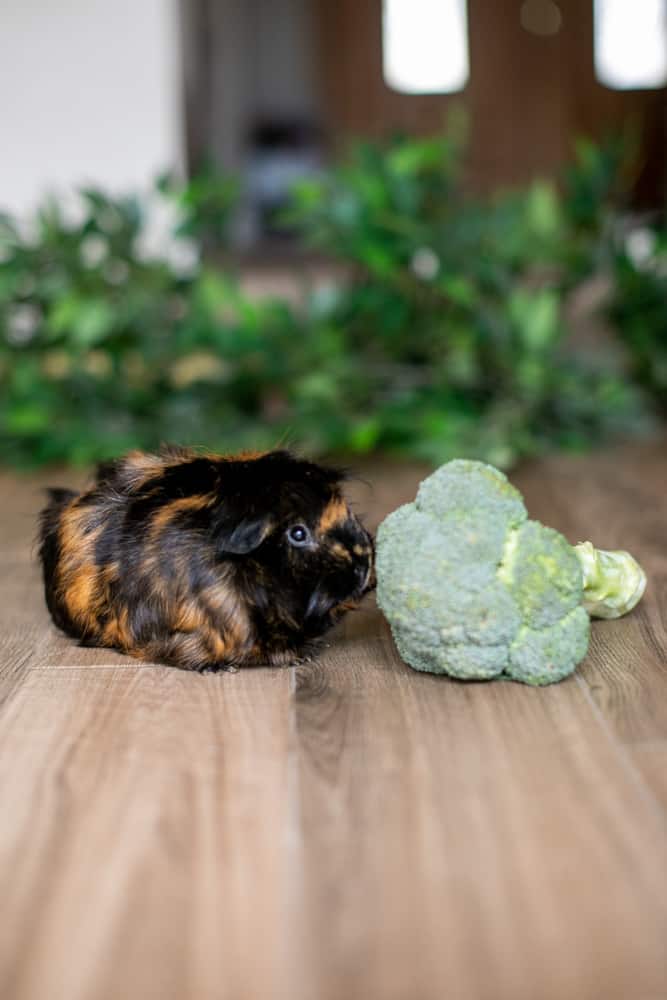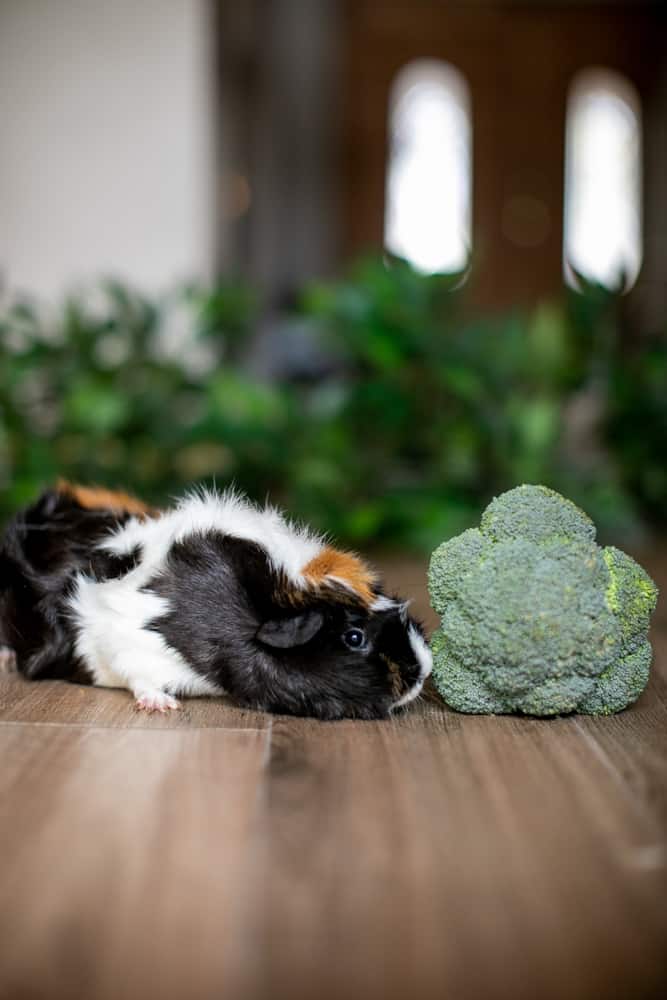As an Amazon Associate we earn from qualifying purchases.
Can guinea pigs eat broccoli? Yes, a guinea pig can safely eat broccoli. Guinea pigs may eat the leaves, stems, and florets of broccoli. Broccoli is a good source of vitamin C for guinea pigs.
Keep reading to learn more about whether cavies can eat broccoli and the nutritional benefits of broccoli for guinea pigs.
Is Broccoli Safe for My Guinea Pig to Eat?
Are you still wondering, “can guinea pigs eat broccoli?”

When it comes to guinea pigs and vegetables, there is a lot of confusion about which ones are safe for them to eat and which ones are not. This is because, as with humans, the nutritional needs of guinea pigs can vary from one individual to the next.
Some guinea pigs may be able to handle broccoli without any problems, while others may experience stomach upset or other health issues after eating it.
That said, broccoli is generally considered a safe vegetable for cavies to eat – as long as it is given in small amounts. When feeding broccoli to your guinea pig, it is important to remember that moderation is key.
This means that you should only give them a few small pieces of broccoli at a time and not make it the main part of their diet. In addition, it is best to cook the broccoli before giving it to your guinea pig, as this can help make it more digestible.
While there are some risks associated with feeding broccoli to guinea pigs, overall, it is considered a safe and healthy vegetable for them to eat. If you have any concerns about whether or not your guinea pig can handle broccoli, be sure to talk to your veterinarian for guidance.
How Often Can Guinea Pigs Eat Broccoli?

A guinea pig can safely eat broccoli as part of a balanced diet. A guinea pig’s diet should consist of fresh vegetables, hay, and a small number of pellets.
When it comes to giving broccoli to your guinea pig, it is best to do so in moderation. This means that broccoli should only make up a small portion of your guinea pig’s diet.
Feeding your cavy broccoli 2-3 times per week is a good way to give them this healthy vegetable while still maintaining a balanced diet.
It is also important to note that not all guinea pigs will enjoy eating broccoli. In fact, some guinea pigs may even refuse to eat it altogether. If this is the case, simply remove the broccoli from your guinea pig’s diet and offer other vegetables instead.
When feeding broccoli to your guinea pig, it is important to make sure that the vegetable is properly prepared. Both raw and cooked broccoli can be fed to guinea pigs, but cooked broccoli is generally easier for them to digest.
If feeding raw broccoli, make sure to chop it into small pieces so that guinea pigs can conveniently eat it. You can also steam or cook the broccoli to make it softer and easier to eat.
What Parts of Broccoli Can Guinea Pigs Eat?
Guinea pigs may eat both the florets and the leaves of broccoli. The stem of broccoli is also safe for a guinea pig to eat, but it is best to avoid giving them the tough end of the stem. Broccoli is a good source of Vitamin C for guinea pigs, so it is a good treat to give them every once in a while.
Overall, all parts of broccoli are safe for a guinea pig to eat. This includes the florets, leaves, and stems. When feeding your guinea pig broccoli, make sure to give them small pieces so they can easily chew and digest it.
Benefits of Adding Broccoli to Your Guinea Pigs’ Diet

Now that we’ve discussed how often to feed your guinea pigs broccoli and the parts of broccoli that are safe for them to eat let’s take a look at some of the benefits of adding broccoli to your guinea pigs’ diet.
1. High Fiber Content
One of the primary benefits of feeding your guinea pigs broccoli is its high fiber content. Guinea pigs need a high-fiber diet in order to stay healthy, and broccoli can help provide them with the fiber they need.
Not only is fiber essential for keeping your guinea pig’s digestive system functioning properly, but it can also help keep them feeling full and satisfied between meals. This can be especially helpful if you are trying to wean your guinea pig off of unhealthy treats or snacks.
2. Good Source of Vitamin C
Broccoli is also a good source of vitamin C, an essential nutrient that guinea pigs need in order to stay healthy. Vitamin C can help support your guinea pig’s immune system, and it is also essential for the formation of new blood cells.
3. Supports a Healthy Digestive System
As we mentioned before, the fiber in broccoli can help keep your guinea pig’s digestive system functioning properly. In addition to fiber, broccoli also contains prebiotics, which is important for guinea pigs’ health.
Feeding your guinea pigs broccoli can help support their overall digestive health and can even help prevent constipation.
4. May Help Prevent Kidney Stones
As guinea pigs age, they are at risk of developing kidney stones. Kidney stones can cause a lot of pain and can even be life-threatening if not treated promptly.
There is some evidence to suggest that the potassium in broccoli may help prevent these stones from forming. Eating broccoli can help keep guinea pigs’ kidneys healthy and may even help extend their lifespan.
5. Promotes Healthy Skin and Coat
Vitamin C is not only essential for your guinea pig’s immune system, but it is also important for their skin and coat health. Vitamin C helps the body produce collagen, a protein that helps keep skin and hair healthy.
Guinea pigs need a diet that is high in vitamin C in order to maintain a healthy coat. Adding broccoli to your guinea pigs’ diet can help ensure that they are getting enough vitamin C and can help keep their skin and coat healthy.
Bottom Line — Can Guinea Pigs Eat Broccoli?
In conclusion, broccoli is safe for cavies to eat in moderation. Make sure to feed them cooked broccoli and only give them small pieces to prevent choking. Broccoli is a healthy treat that can be fed to your guinea pig a few times a week. Consult your vet if are still concerned about your cavy’s diet.